‘Reasonably optimistic’: Are Switzerland’s Covid hotspots cooling down at last?
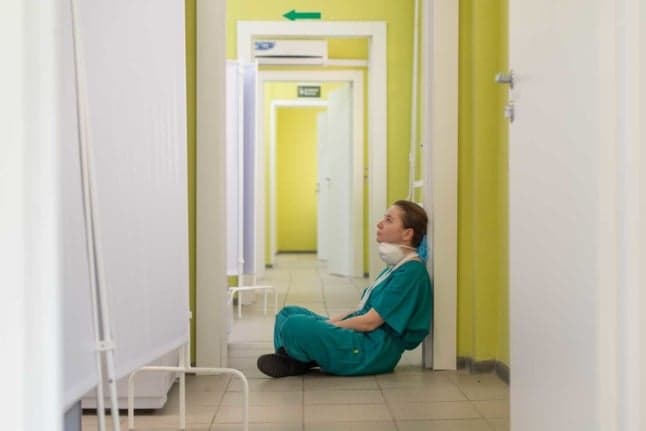
Soaring infections but stable hospitalisation and death rates: this is what the epidemiological situation looks like this week across Switzerland.
There is an obvious paradox in Switzerland’s coronavirus-related data: while the number of infections is record-high with over 38,000 new cases reported on Wednesday, most health experts draw a fairly upbeat picture of the pandemic’s evolution.
According to Virginie Masserey, head of the infection control section at the Federal Office of Public Health (FOPH), “we can be reasonably optimistic” that the worst of the pandemic is behind us.
In fact, with more people contracting the highly contagious Omicron virus, the level of immunity is growing within the population, signalling, as many epidemiologists believe, pandemic’s end .
READ MORE: When will the Covid pandemic end in Switzerland?
Also paradoxically, despite the record-breaking number of infections, the overall situation in terms of geographical distribution of cases looks better that last week’s.
The bulk of cases are now concentrated in Geneva, where the infection rate of 6,606.39 per 100,000 people exceeds the national average of 4,087.09 / 100,00, followed by Valais (6100.09).
But while the situation in French-speaking regions, as well as in Graubünden and Ticino, is still tense, infection rates in other cantons fall below the national average.
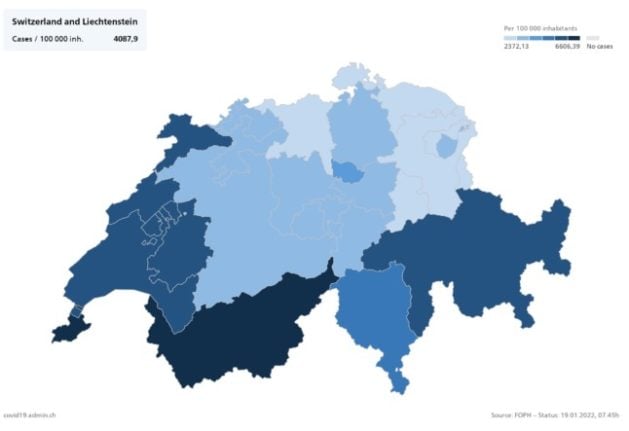
Image: FOPH
For comparison, this is what the situation looked like a week ago, on January 13th.
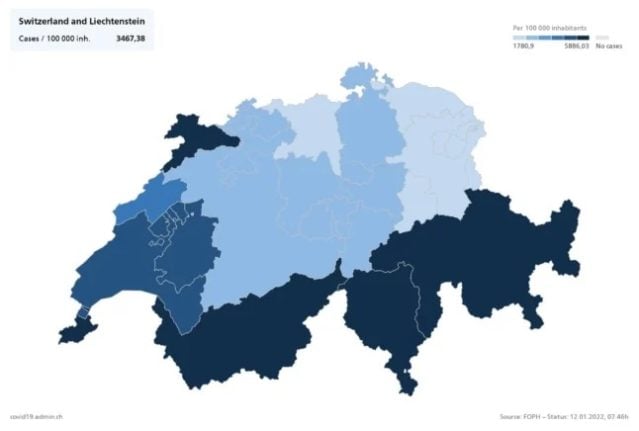
Image: FOPH
What about hospitalisations?
If health authorities are not panicking and, in fact, have just relaxed some measures, it is because the high infection rates are not reflected in the number of Covid-related hospital admissions.
Despite repeated warnings throughout November and December that the healthcare system was on the verge of being saturated and triage was imminent, this has not happened.
As at January 18th, there were 247 Covid patients in Swiss ICUs — 20 less than last week.
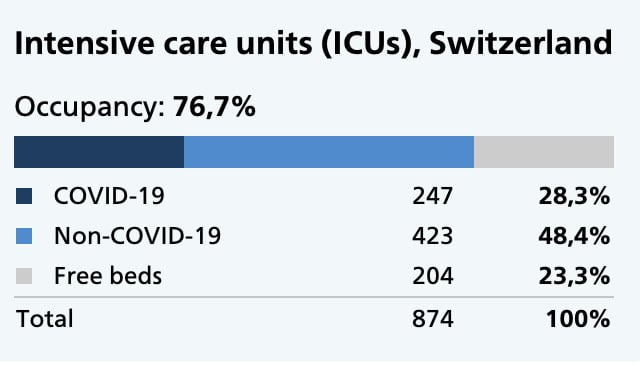
Image: FOPH
Health officials attribute this to the fact that Omicron, which currently accounts for nearly 88 percent of all infections in Switzerland, is less virulent than its predecessors Delta and Alpha, especially among the vaccinated population.
This means that vaccinated and boosted people are much less likely to have severe symptoms and end up in hospitals than their unvaccinated counterparts.
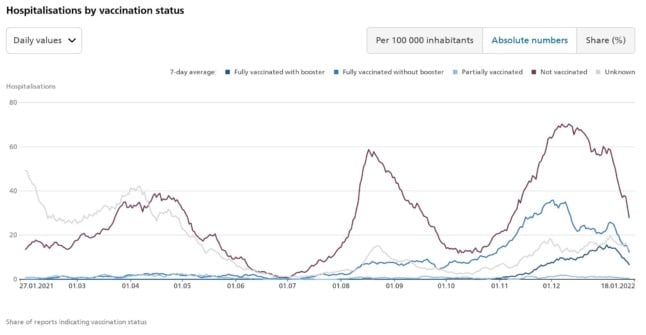
Image: FOPH
The same applies to Covid-related deaths: their number remains low and stable, but is most prevalent among the unvaccinated, as this chart indicates:
READ MORE: Covid in Switzerland: How common are hospitalisations and deaths among the boosted?
At this point, nearly 68 percent of Switzerland's population is fully vaccinated, with 35.47 percent having received the third shot — rates that still trail below the European Union average.
However, within the most vulnerable group — those over 65 years of age — 90.64 percent have had two shots, and 71.56 percent have had their booster dose as well.
Comments
See Also
There is an obvious paradox in Switzerland’s coronavirus-related data: while the number of infections is record-high with over 38,000 new cases reported on Wednesday, most health experts draw a fairly upbeat picture of the pandemic’s evolution.
According to Virginie Masserey, head of the infection control section at the Federal Office of Public Health (FOPH), “we can be reasonably optimistic” that the worst of the pandemic is behind us.
In fact, with more people contracting the highly contagious Omicron virus, the level of immunity is growing within the population, signalling, as many epidemiologists believe, pandemic’s end .
READ MORE: When will the Covid pandemic end in Switzerland?
Also paradoxically, despite the record-breaking number of infections, the overall situation in terms of geographical distribution of cases looks better that last week’s.
The bulk of cases are now concentrated in Geneva, where the infection rate of 6,606.39 per 100,000 people exceeds the national average of 4,087.09 / 100,00, followed by Valais (6100.09).
But while the situation in French-speaking regions, as well as in Graubünden and Ticino, is still tense, infection rates in other cantons fall below the national average.

Image: FOPH
For comparison, this is what the situation looked like a week ago, on January 13th.

Image: FOPH
What about hospitalisations?
If health authorities are not panicking and, in fact, have just relaxed some measures, it is because the high infection rates are not reflected in the number of Covid-related hospital admissions.
Despite repeated warnings throughout November and December that the healthcare system was on the verge of being saturated and triage was imminent, this has not happened.
As at January 18th, there were 247 Covid patients in Swiss ICUs — 20 less than last week.

Image: FOPH
Health officials attribute this to the fact that Omicron, which currently accounts for nearly 88 percent of all infections in Switzerland, is less virulent than its predecessors Delta and Alpha, especially among the vaccinated population.
This means that vaccinated and boosted people are much less likely to have severe symptoms and end up in hospitals than their unvaccinated counterparts.

Image: FOPH
The same applies to Covid-related deaths: their number remains low and stable, but is most prevalent among the unvaccinated, as this chart indicates:
READ MORE: Covid in Switzerland: How common are hospitalisations and deaths among the boosted?
At this point, nearly 68 percent of Switzerland's population is fully vaccinated, with 35.47 percent having received the third shot — rates that still trail below the European Union average.
However, within the most vulnerable group — those over 65 years of age — 90.64 percent have had two shots, and 71.56 percent have had their booster dose as well.
Join the conversation in our comments section below. Share your own views and experience and if you have a question or suggestion for our journalists then email us at [email protected].
Please keep comments civil, constructive and on topic – and make sure to read our terms of use before getting involved.
Please log in here to leave a comment.